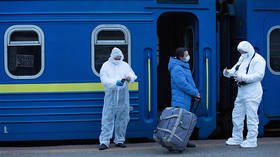Ukrainian Railways records losses of up to $500 million after Moscow-Kiev train connection is closed due to Covid-19

The lack of railway connection between Moscow and Kiev has so severely affected the state-owned Ukrainian Railways company that its losses may have reached around 14 billion hryvnia ($500 million) in 2020 alone.
That’s according to CEO Vladimir Zhmak, who told the Ukraine 24 TV channel that the Kiev-Moscow route was one of its most profitable. In 2019, four of his companies top five money-making destinations were in Russia, helping to subsidise many uneconomical domestic services.
Rail service between the countries was suspended in March 2020 and has subsequently left a considerable hole in the state budget.
The closing of the borders also meant an end to the Moscow-Lvov train – another route that makes good money for the government coffers.
Also on rt.com 7 years after it returned to Russia, Ukraine ‘ready to consider compromises’ on status of Crimea – former President Kravchuk“It’s definitely not profitable for Ukraine Railways to stop passenger traffic with Moscow,” Zhmak said. “Now, all these passengers go through Minsk.”
In the opinion of the Ukrainian economist and political scientist Alexander Dudchak, the end of a rail connection with Russia could eventually send the entire company under, which will subsequently have significant consequences on the Ukrainian budget. The exact figures are not yet available, but could reach up to half a billion dollars.
“Before the pandemic, only Ukrainian trains went to Russia and back, and last year, the company’s losses were enormous,” he told RT. “It’s clear that there’s a quarantine now, but whether Ukraine will restore traffic when the pandemic ends is a big question. Unfortunately, Kiev tends to neglect common sense in favor of Russophobic initiatives.”
According to experts interviewed by RT, the state-owned railway company has been in a permanent crisis since the fall of the Soviet Union, surviving mainly due to cooperation with Russia, along with loans and high transportation tariffs. The company is also suffering from outdated and worn-out stock, with Ukrainian MP Alexander Skichko revealing that around 90 percent of the country’s fleet of locomotives, freight cars, and passenger cars are in desperate need of replacement.
Despite being so reliant on Russia, Kiev is looking towards the EU for help. Under an association agreement with the bloc, the authorities must turn the state-owned monopoly into a holding company with four vertically integrated companies. However, according to Vladimir Olenchenko, a senior researcher at the Russian Institute of World Economy and International Relations, the problems faced by Ukraine’s railways are primarily caused by the country’s policy towards Moscow, and the EU’s help might not help that much.
“European track and infrastructure modernization – all this sounds nice, but then there’s the insoluble question of financing,” Olenchenko told RT. “In general, Ukraine’s economy is still too closely linked to Russia’s.”
Think your friends would be interested? Share this story!














